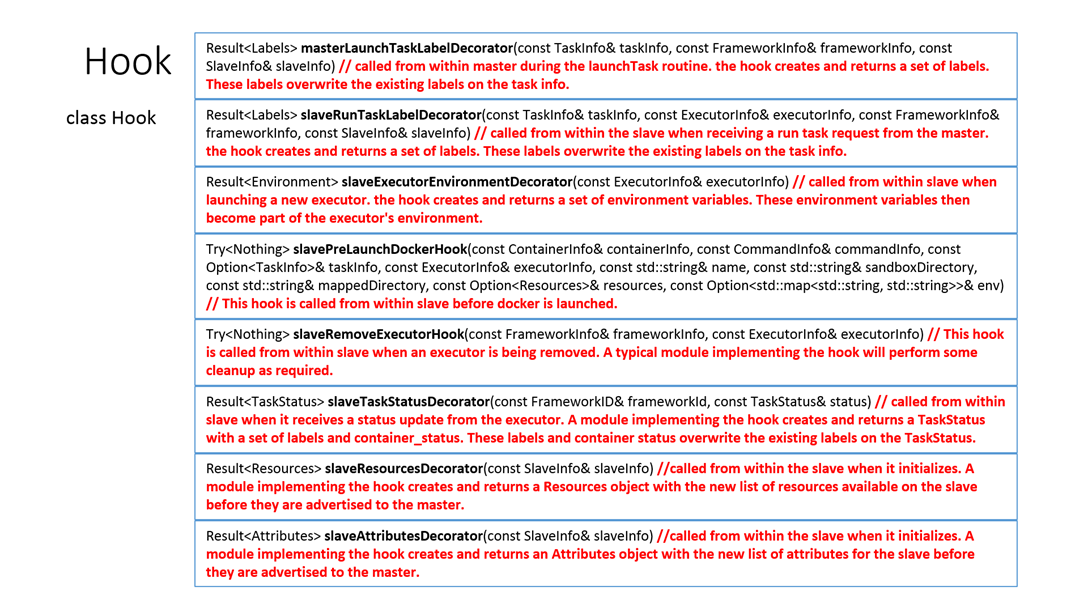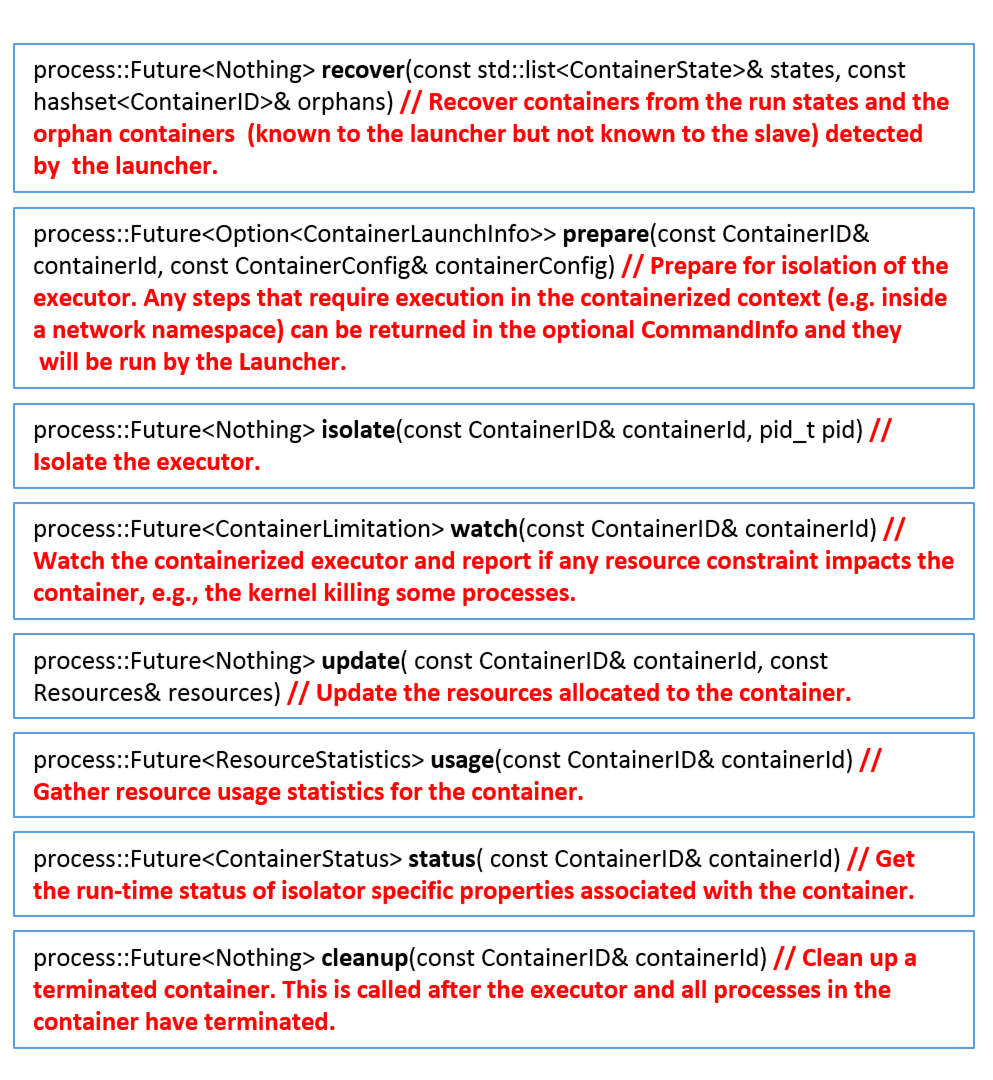Mesos源码分析(4) Mesos Master的启动之三
3. ModuleManager::load(flags.modules.get())如果有参数--modules或者--modules_dir=dirpath,则会将路径中的so文件load进来
代码中加载模块的代码如下

对应的命令行参数如下:

都可以写什么Module呢?
首先是Allocator
默认是内置的Hierarchical Dominant Resource Fairness allocator
要写一个自己的Allocator:
- 通过--modules加载so
- 通过--allocator参数指定
当然很少有人会重写这个Allocator,因为这是Mesos的精髓所在,但是可以对默认的Alllocator进行加强的。
参考文档http://mesos.apache.org/documentation/latest/allocation-module/
Mesos Allocation Modules
The logic that the Mesos master uses to determine which frameworks to make resource offers to is encapsulated in the master's allocator module. The allocator is a pluggable component that organizations can use to implement their own sharing policy, e.g. fair-sharing, priority, etc., or tune the default hierarchical Dominant Resource Fairness algorithm (see the DRF paper).
To use a custom allocator in Mesos, one must:
- Implement the Allocator interface as defined in mesos/allocator/allocator.hpp,
- Wrap the allocator implementation in a module and load it in the Mesos master.
Writing a custom allocator
Allocator modules are implemented in C++, the same language in which Mesos is written. They must subclass the Allocator interface defined in mesos/allocator/allocator.hpp. However, your implementation can be a C++ proxy, which delegates calls to an actual allocator written in a language of your choice.
The default allocator is HierarchicalDRFAllocatorProcess, which lives in$MESOS_HOME/src/master/allocator/mesos/hierarchical.hpp. Like most Mesos components, it is actor-based, which means all interface methods are non-blocking and return immediately after putting the corresponding action into the actor's queue. If you would like to design your custom allocator in a similar manner, subclass MesosAllocatorProcess from$MESOS_HOME/src/master/allocator/mesos/allocator.hpp and wrap your actor-based allocator inMesosAllocator. This dispatches calls to the underlying actor and controls its lifetime. You can refer to HierarchicalDRFAllocatorProcess as a starting place if you choose to write your own actor-based allocation module.
Additionally, the built-in hierarchical allocator can be extended without the need to reimplement the entirety of the allocation logic. This is possible through the use of the Sorter abstraction. Sorters define the order in which hierarchy layers (e.g. roles or frameworks) should be offered resources by taking "client" objects and some information about those clients and returning an ordered list of clients.
Sorters are implemented in C++ and inherit the Sorter class defined in$MESOS_HOME/src/master/allocator/sorter/sorter.hpp. The default sorter is DRFSorter, which implements fair sharing and can be found in$MESOS_HOME/src/master/allocator/sorter/drf/sorter.hpp. This sorter is capable of expressing priorities by specifying weights in Sorter::add(). Each client's share is divided by its weight. For example, a role that has a weight of 2 will be offered twice as many resources as a role with weight 1.
Wiring up a custom allocator
Once a custom allocator has been written, the next step is to override the built-in implementation with your own. This process consists of several steps:
- Wrap your allocator in a Mesos allocator module,
- Load this module in Mesos master.
An allocator module is a factory function and a module description, as defined inmesos/module/allocator.hpp. Assuming the allocation logic is implemented by theExternalAllocator class declared in external_allocator.hpp, the following snippet describes the implementation of an allocator module named ExternalAllocatorModule:
#include <mesos/allocator/allocator.hpp>
#include <mesos/module/allocator.hpp>
#include <stout/try.hpp>
#include "external_allocator.hpp"
using namespace mesos;
using mesos::allocator::Allocator;
using mesos::internal::master::allocator::HierarchicalDRFAllocator;
static Allocator* createExternalAllocator(const Parameters& parameters)
{
Try<Allocator*> allocator = ExternalAllocator::create();
if (allocator.isError()) {
return nullptr;
}
return allocator.get();
}
// Declares an ExternalAllocator module named 'ExternalAllocatorModule'.
mesos::modules::Module<Allocator> ExternalAllocatorModule(
MESOS_MODULE_API_VERSION,
MESOS_VERSION,
"Mesos Contributor",
"engineer@example.com",
"External Allocator module.",
nullptr,
createExternalAllocator);
Refer to the Mesos Modules documentation for instructions on how to compile and load a module in Mesos master.
Hook
你可以写hook模块,讲代码插在很多关键的步骤,从而改写整个Executor或者Docker或者Task的启动的整个过程。
可以干预的hook的地方定义在mesos/hook.hpp中。
Class hook定义如下:

其中比较常用的是slavePrelaunchDockerHook,可以在Docker启动之前做一些事情,比如准备工作。
还有slaveRemoveExecutorHook,这个可以在executor结束的时候,做一些事情,比如清理工作。
要加载一个hook需要:
- 通过--modules加载so
- 通过--hooks加载hook
./bin/mesos-agent.sh --master=<IP>:<PORT> --modules="file://<path-to-modules-config>.json" --hooks=TestTaskHook
Isolator
可通过--isolation=VALUE指定,仅仅用于Mesos Containerizer。
在src/slave/containerizer/mesos/container.cpp里面

默认只会有cpu和memory
|
然后是创建Mesos Containerizer的Launcher
|
然后就是创建Isolator
|
所有的isolator会放在一个vector里面
|
最终创建MesosContainerizer
|
那isolator是如何起作用的呢?
当一个MesosContainerizer启动一个进程的时候,会调用如下的函数。
在src/slave/containerizer/mesos/containerizer.cpp中有

里面最重要的一步是fork一个进程
|
最后还会调用isolate不断的检验这个进程是否使用适当的资源。
|
Isolator定义了以下函数


中会调用

Master Contender and Detector
Detector是检测哪个是Mesos-Master的Leader,Contender是自己竞争成为Mesos-Master的leader。默认使用zookeeper。
4. Mesos-Master启动的第四步是加载Hook, HookManager::initialize(flags.hooks.get())

Mesos源码分析(4) Mesos Master的启动之三的更多相关文章
- Mesos源码分析(5): Mesos Master的启动之四
5. Create an instance of allocator. 代码如下 Mesos源码中默认的Allocator,即HierarchicalDRFAllocator的位置在$ME ...
- Mesos源码分析(2): Mesos Master的启动之一
Mesos Master的启动参数如下: /usr/sbin/mesos-master --zk=zk://127.0.0.1:2181/mesos --port=5050 --log_dir=/va ...
- Mesos源码分析(6): Mesos Master的初始化
Mesos Master的初始化在src/master/master.cpp中 在Mesos Master的log中,是能看到这一行的. 1.初始化role,并设置weight权重 ...
- Mesos源码分析(3): Mesos Master的启动之二
2. process::firewall::install(move(rules));如果有参数--firewall_rules则会添加规则 对应的代码如下: // Initialize fire ...
- Mesos源码分析(1): Mesos的启动过程总论
- Mesos源码分析(9): Test Framework的启动
我们以Test Framework为例子解释Framework的启动方式. Test Framework的代码在src/examples/test_framework.cpp中的main函数 首先要指 ...
- Mesos源码分析
Mesos源码分析(1): Mesos的启动过程总论 Mesos源码分析(2): Mesos Master的启动之一 Mesos源码分析(3): Mesos Master的启动之二 Mesos源码分析 ...
- Mesos源码分析(11): Mesos-Master接收到launchTasks消息
根据Mesos源码分析(6): Mesos Master的初始化中的代码分析,当Mesos-Master接收到launchTask消息的时候,会调用Master::launchTasks函数. v ...
- Mesos源码分析(10): MesosSchedulerDriver的启动及运行一个Task
MesosSchedulerDriver的代码在src/sched/sched.cpp里面实现. Driver->run()调用start() 首先检测Mesos-Maste ...
随机推荐
- 洛谷 P2330 [SCOI2005]繁忙的都市
题目链接 https://www.luogu.org/problemnew/show/P2330 题目描述 城市C是一个非常繁忙的大都市,城市中的道路十分的拥挤,于是市长决定对其中的道路进行改造.城市 ...
- 洛谷 P1983 车站分级
题目链接 https://www.luogu.org/problemnew/show/P1983 题目描述 一条单向的铁路线上,依次有编号为 1,2,…,n的 n个火车站.每个火车站都有一个级别,最低 ...
- golang自动构建脚本
#!/bin/sh #代码分支 branch_c=$ branch_p=$ #服务器 server=$ #构建版本 version=$ case $server in test1) echo &quo ...
- UMeditor控制多张图片上传顺序
多张图片上传的顺序,受到用户使用习惯.插件上传和插件插入页面顺序的影响. 估计是考虑到上传性能,官方没有提供UMeditor控制展示顺序的配置.在上传过程中,用户点击拖动的第一张图片,将作为文件数组中 ...
- C# Levenshtein计算字符串的相似度
static void Main(string[] args) { Levenshtein(@"今天天气不错", @"今天的天气不错啊"); Console.R ...
- Nginx 自定义添加Response Headers 修改server
之前说过如何隐藏Response Headers中 X-Powered-By 修改php.ini expose_php = Off service php-fpm reload 隐藏Nginx版本号 ...
- c/c++再学习:C与Python相互调用
c/c++再学习:Python调用C函数 Python 调用C函数比较简单 这里两个例子,一个是直接调用参数,另一个是调用结构体 C代码 typedef struct { int i1; int i2 ...
- python 字典、列表、字符串 之间的转换
1.列表与字符串转换 1)列表转字符串: 将列表中的内容拼接成一个字符串 将列表中的值转成字符串 2)字符串转列表: 用eval转换 将字符串每个字符转成列表中的值 将字符串按分割成列表 2.列表与字 ...
- 源生API解析XML文档与dom4j解析XML文档
一.XML语言 XML是一种可扩展的标记语言,是一种强类型的语言,类似HTML(超文本标记语言,是一种弱类型的语言).XML是一种通用的数据交换格式(关系型数据库),综上所诉:XML可以传输数据,也可 ...
- 代码调用t.cn接口生成短址
新浪短网址接口的稳定性和跳转速度还是很给力的,现给出其API说明. 该接口支持两种返回格式:xml和json 对应的URL请求地址为: xml:http://api.t.sina.com.cn/sho ...
